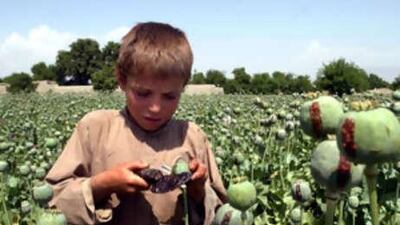JALALABAD // Attempts to eradicate opium production in eastern Afghanistan have left farmers destitute and angry with the government. Villagers in the province of Nangarhar, bordering Pakistan, said they have barely been able to feed their families since they stopped growing the poppies the drug comes from. "It has affected every angle of our life," said Zayed Ullah, a father of 11. "Now we can only cultivate wheat and it's just enough for us to eat, nothing is left. We need money to take patients to the doctor, we need money to buy clothes, we need money for weddings and funerals, but where can we get it?"
Afghanistan produces more than 90 per cent of the world's opium, with much of the money going to fund a resurgent Taliban and the government is under increasing pressure from the US military and the international community to tackle the problem. Farmers in Nangarhar said they agreed last year to stop growing poppies, accepting offers of redevelopment and alternative livelihood projects instead. It was a huge step for them as it removed a regular source of income they had enjoyed for generations, and now they say they have received little in return.
Jan Zib used to earn the equivalent of about US$8,000 (Dh29,360) from the annual harvest in his village. Now he works as a labourer in Jalalabad, the capital of Nangarhar, and makes about $2,000 a year. "Our area is a tribal area and the elders have said they will accept the order of [President Hamid] Karzai and not cultivate poppies," he said. "But it's optional. The government must keep its promises and offer us alternatives.
"Now the people don't have a main source of income. Those who grow wheat have just enough to feed their own families." According to farmers across the province, opium production has been central to Nangarhar's economy for decades. During the time the Taliban was in power from 1996 to 2001, opium poppy growing was banned, but some farmers in remote parts of the province said they were able to keep growing the crop.
"This is the only year I can remember when there has been no poppy field on our lands," Mr Zib said. "We used to cultivate poppies when the king was in power and even before I came into this world." While the Afghan government has said the Taliban use money from opium sales to fund their insurgency, the feeling in Nangarhar is that eradication could just as easily end up strengthening the militants by turning sentiment against the government.
"It's the only option people are left with," Mr Zib said. "If they have no jobs and no income, of course they will join the Taliban because that's the only way for them to live. Better to do anything than to die." Last year, opium cultivation rose by 285 per cent in Nangarhar. No figures for 2008 are available yet, but the ministry of counter narcotics in Kabul anticipates a "massive reduction". Zulmay Afzali, the ministry's spokesman, said the government did not give financial compensation to the farmers for giving up poppy farming as that would be like rewarding a thief to stop robbing people.
"The poppy is not something given to Afghans by their forefathers. This is un-Islamic, un-Afghan and inhuman," he said. However, there is something called a Good Performance Initiative, which he dubbed a "reward from the president". This provides provinces that are opium free with money to improve their infrastructure. The ministry of counter narcotics also has its own trust fund, which finances redevelopment projects in conjunction with other ministries.
But Mr Zib said his village had seen little of the rewards. "The government has not kept one of its promises," he said. "Maybe some money was sent to the village, but that has been stolen and it has not reached the poor people." He said residents were now angry and scared, having also had their fields sprayed with chemicals by "foreigners" two years ago. The government denies the fields were treated and Mr Karzai has pointedly rejected a US proposal to spray all the poppy fields as they do in Latin America.
Mr Afzali said the illegal drugs trade in Afghanistan was estimated to be worth more than $4 billion a year. He said the money is "going directly to supporting the insurgency, corruption and crime problems, not only in Afghanistan but all over the world". "It's not that the people are growing poppies because they are poor - I completely reject this. We have the evidence that terrorists and the international mafia force them to grow poppies."
Back in Nangarhar, Mohammed Eshaq clearly disagrees. With five daughters, two sons and a pregnant wife to look after he now works as a labourer having given up farming some years ago. "When poppies were allowed the opium was like a dollar note," he said. "If you had it you knew you had a bundle of dollars in your pocket. People would keep it in their rooms and if they needed to buy clothes or food, they would take the opium to the market and sell it at a very high price."
For Mr Eshaq, the resentment that is growing among villagers in his province and elsewhere will have one obvious result. "I remember when I was young my dad was saying that Afghans are very brave people and they can never accept strangers occupying their country. He said even if the foreigners had very advanced weapons, Afghans would be able to kick them out using their empty hands." csands@thenational.ae

